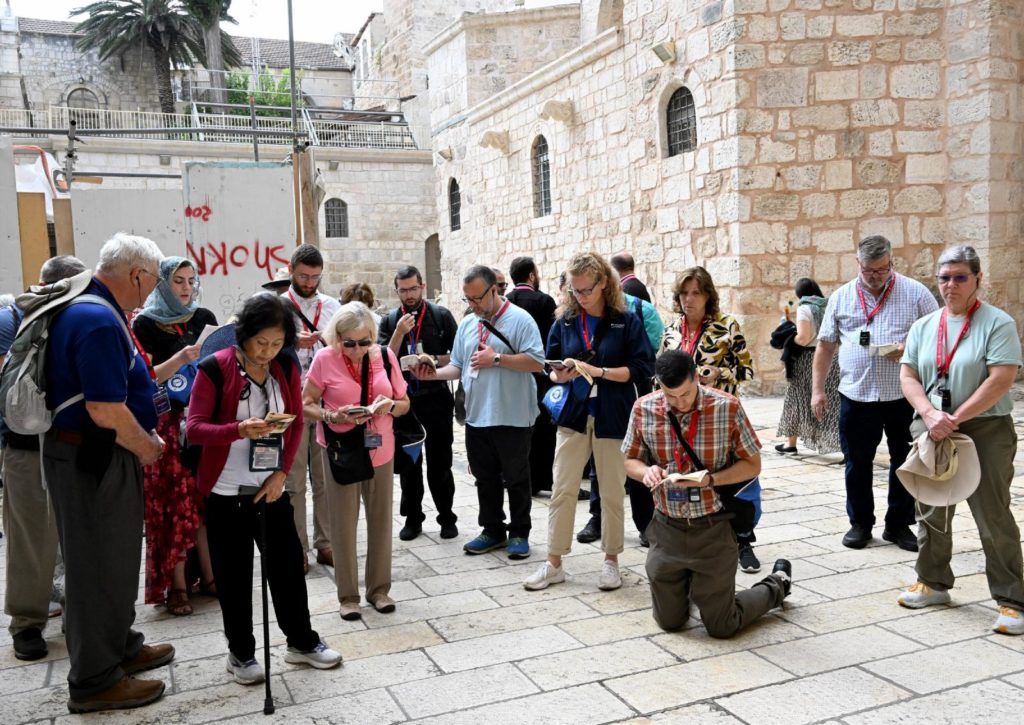Early on Oct. 7, Jesus Fernandez was flying into Tel Aviv to organize a conference to help some Arab government leaders work toward normalizing relations with Israel, as envisioned in the Abraham Accords. When the plane ended Wi-Fi service shortly before landing, he was optimistic.
Minutes later, as Wi-Fi returned on the runway, “we had received about 1,000 notifications about rockets hitting the southern part of Israel — and the hostages,” said Fernandez, a 2016 graduate of St. Anthony High School in Long Beach who is now associate director of global events for the Atlantic Council.
The conference was canceled. Fernandez hesitates to predict the future of the effort. His advice to LA Catholics who want to help is to support the major Catholic organizations doing humanitarian work in and around the war zone. “There are Christian leaders doing great work over there,” he said. “Remember the most vulnerable and find ways that you can support them.”
Catholics from Southern California are known for stepping up with that kind of support when it’s been most needed.
Denise Scalzo is councilor for the Western Lieutenancy of the Equestrian Order of the Holy Sepulchre of Jerusalem — whose grand prior is Archbishop José H. Gomez of Los Angeles — and a founder of the Franciscan Foundation for the Holy Land.
A professional fundraiser who lives in the San Diego area, Scalzo has been to the Holy Land 103 times since 1991. She was scheduled for a medical mission when the war erupted.
“I don’t take sides,” she said of the current situation. Rather, Scalzo’s foundation works to keep a Christian presence in a region known for complex tensions and competing claims.
Three decades ago, “Christians were leaving the country and we were trying to provide enough for them to stay there,” Scalzo said. “They really didn’t want to leave. But they wanted their children to be in a safe community. So we worked on supporting basic human rights and resources that are important for their community.”
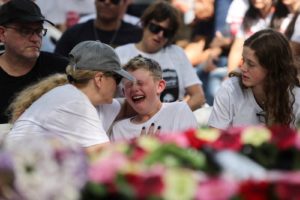
To do that, the Franciscan Foundation supplements income from the Holy Land collection, which churches around the world take on Good Friday for Franciscan ministry in the lands of Jesus and the earliest Christians. The popes have given custody of the Holy Land to the Franciscans since the 13th century because of their history of evangelizing through friendship. The foundation, incorporated in 1994, is intended to keep a Christian presence there, and provides humanitarian and educational assistance to everyone in those communities, regardless of faith or ethnicity.
Franciscan aid programs range from scholarships and music education to housing. Children Without Borders organizes soccer teams of Christians, Muslims, and Jews so that they interact with one another. It also sponsors the interfaith Children’s March for Peace each year in Bethlehem.
“Saying that all Palestinians are like Hamas is like saying that all Italians are like the mafia,” Scalzo said.
The people of Gaza endure especially harsh conditions, she said. Although that region has always been impoverished, after Hamas was elected to govern it in 2007, Israel and Egypt established blockades. It is extremely difficult for residents to leave, even in cases of dire need.
The young people who participated in church-sponsored programs in the 1990s “were more hopeful. They would say, ‘We don’t dislike Jews and other people the way our parents do.’... Seeing that break down is really hard to watch,” she said.
“But there is such a difference between going through the intifada and watching what is happening now.”
Late last month, the Vatican’s ambassador to the United Nations, Archbishop Gabriele Caccia, declared that the Holy see “unequivocally condemns the terrorist attack carried out by Hamas and other armed groups,” calling the killings crimes that “demonstrate utter contempt for human life.”
He also reminded the world that responsibility for terrorist acts “can never be attributed to an entire nation or people” and urged the governments of Israel and Palestine to “renew their commitment toward a peace based on justice and respect for the legitimate aspirations of both sides.”
Meanwhile, the Franciscan Foundation estimates that within 50 years the Christian community will vanish from the lands where Jesus walked unless major steps are taken to support them and the communities in which they live.
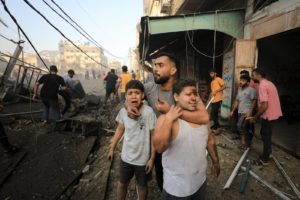
When the Holy See founded a relief committee during the Arab-Israeli War in 1949 — which it had entrusted to the Catholic Near East Welfare Association (CNEWA) — Christians comprised 20% of the Holy Land population. Today they are less than 2%, and just 1,000 of Gaza’s 2.2 million residents are Christian. CNEWA works in and through the Eastern Catholic Churches of the Holy Land, as well as in Eastern Europe and northeast Africa, to support their pastoral and humanitarian work.
“We always work through local institutions and the local church, but in places like Gaza, the Church is tiny,” said Michael La Civita, communications director for CNEWA. “The Church has many institutions there, such as schools and health care centers, but almost 100% of the population that they serve is Muslim.”
CNEWA has spent years helping humanitarian organizations in Gaza prepare for such an emergency. At Al-Ahli Arab Hospital, a Christian facility that was struck on Oct. 17 by a shell of disputed origin, “95% of the energy was supplied by solar panels. We installed those solar panels.” La Civita said.
Because all of CNEWA’s aid money is delivered and distributed through the Church, the agency has been able to continue transferring funds for the purchase of any relief supplies that are available, he said. The arrival of those supplies, however, has been hampered by the limited number of aid trucks able to enter Gaza.
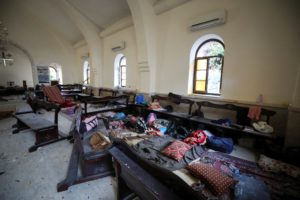
The most important Christian holy site in Gaza is St. Porphyrios Church, an Orthodox parish that traces its roots to the 5th century. Hundreds of people were sheltering in a multipurpose building on the church campus when it collapsed under fire on Oct. 19. Among at least 16 killed were a staff member of the international Catholic relief agency Caritas, her husband, and their infant daughter.
The 26-year-old staff member had “served as a lab technician with the mobile medical teams, tending to the needs of the most vulnerable people in Gaza,” said Marta Petrosillo, fundraising director for Caritas International.
By Oct. 20, the Arab Orthodox Cultural Center — which CNEWA supports — was caring for 3,000 refugees, while Catholic and Orthodox churches were sheltering hundreds of others.
“Israel and Palestine have a very strong Catholic presence that I don’t think people are aware of,” said Margaret Romano, lieutenant of the Western USA lieutenancy of the Equestrian Order of the Holy Sepulchre of Jerusalem and a parishioner at St. Philip in Pasadena.
“The sisters there and the Franciscan priests work so very hard to bring the faith to the people; and keep them strong in their faith and give them hope. To see these events now is just heartbreaking.”
The Order of the Holy Sepulchre dates to the Crusades. In the 19th century the Holy See assigned it to support ministries of the Latin Patriarchate of Jerusalem — including educational and social services that benefit people of all faiths — and has since expanded its work to include churches throughout the Middle East.
“We’ve become friends with people there who just want to raise their families like we do. They are people of very great faith,” Romano said.
She cited a letter from Suhail Abodawood, an 18-year-old Palestinian Christian who was sheltering with 700 others in Gaza’s Holy Family Church.
“I know that we are safe and secure in my Lord’s hands, Jesus Christ,” he wrote in a letter published by Vatican News. “I am praying and fasting in the church right now[.]”
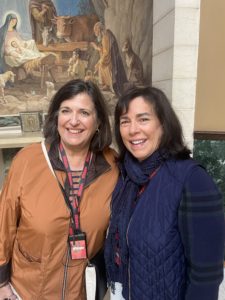
Romano has also been inspired by the words and actions of Cardinal Pierbattista Pizzaballa, the Latin Patriarch of Jerusalem, whose religious and humanitarian ministries her order supports. On Oct. 16 Pizzaballa told journalists that he was willing to be exchanged for the Israeli children that Hamas had taken hostage.
In a pastoral letter, he called for “ending decades of occupation and its tragic consequences,” saying that this was necessary for “a serious peace process” to begin.
But he stressed that the roots of peace are spiritual.
“It was on the cross that Jesus won: not with weapons, not with political power, not by great means, nor by imposing himself. The peace He speaks of has nothing to do with victory over others. He won the world by loving it,” he wrote.
“It takes courage to be able to demand justice without spreading hatred. It takes courage to ask for mercy to reject oppression, to promote equality without demanding uniformity, while remaining free.”
It’s a message that people like Scalzo have taken to heart. Recently at church, she wrote a petition for Hamas, Hezbollah, the Taliban and ISIS “that they have conversion of heart.”
“All of this is demonic,” said Scalzo. “How can people possibly change if you don’t pray for them? Of course, we pray for the people who are struggling. Of course, we pray for survival for everyone. But if we don’t pray for a conversion of hearts, what is the purpose of our faith?”
How to help the Holy Land
Here are web links to some Catholic organizations working for peace and providing humanitarian aid in the Israel-Hamas War.
- Catholic Near East Welfare Association Emergency Holy Land Fund: cnewa.org/what-we-do/emergency-relief-holy-land
- Catholic Relief Services (U.S. arm of Caritas International): support.crs.org/donate/holy-land-conflict
- Equestrian Order of the Holy Sepulchre Humanitarian Fund: eohsjwesternusa.org/spotlight/humanitarian-fund-link
- Franciscan Foundation for the Holy Land Humanitarian Programs: ffhl.org/programs/humanitarian
